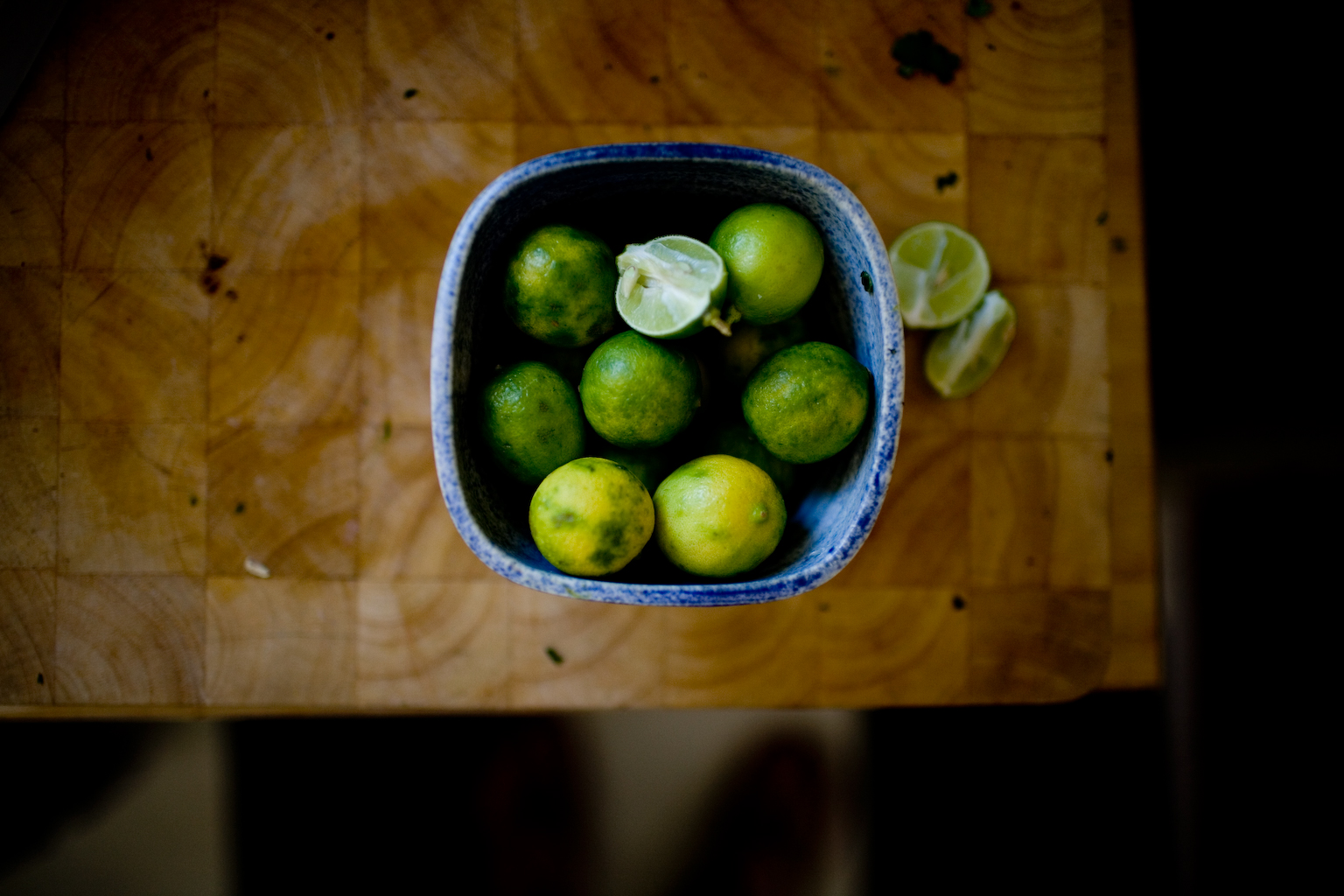A few years ago Gustavo Arellano reported in an L.A. TACO piece that lime prices often skyrocket in the spring causing many taquerías to temporarily switch to lemons in order to control costs.
If my experience squeezing a lemon wedge on a burrito recently is any indicator, then the problem persists: lemon’s acid just doesn’t cut it when it comes to the Taco Life. And while there may be no way to quickly solve the political and narco violence-based issues at the heart of the matter, a bartender from Louisville, KY, has developed a technique that may just be the answer.
The bartender, Colonel Nickle Morris (that’s right, he’s an official Kentucky Colonel), calls his creation “super juice,” and increases the yield, life, and flavor of lime juice. It could save bars, taquerías, cevicherías, and any other lime juice-dependent business thousands of dollars, and make them less vulnerable to upswings in the price of limes All while wasting less product in the process.
The last few decades have seen a dramatic improvement in the quality of cocktails being produced in bars all across the country, a large part due to the use of fresh citrus juice. And while anyone who has had a margarita made with fresh lime instead of sour mix was likely grateful for the change, one huge downside to using fresh juice is waste. As implied by the name, fresh juice needs to be, well, fresh. Lime is particularly fragile, as it oxidizes remarkably fast, and it needs to be used within 24 hours of being juiced, ideally even sooner. In bars, where it can be hard to predict exactly how much juice to prep before every shift, a lot of unused, freshly squeezed juice ends up going to waste. Additionally, lime peels, which, despite being packed full of lime oil (i.e. flavor), are often discarded once the fruit is juiced. While there are techniques to make use of these products before they are thrown out, there is a huge incentive to produce less potential waste to begin with.
Enter, Colonel Morris and his super juice.
After managing a high volume cocktail bar in Hong Kong, Morris grew frustrated with citrus waste and set out to come up with a solution. He found it by focussing not on the juice itself, but instead on the lime peels. There’s a long tradition in the world of cocktails of utilizing citrus peels in the form of a syrup called oleo saccharum. It’s made by macerating the peels in sugar, the latter of which pulls the oils from the peel, turning the whole mixture into a citrus oil syrup. Oleo saccharum may be delicious, but in most bars, it’s next to impossible to go through enough to truly make the most of flavorful lime peels. Morris realized he could use the same technique as oleo saccharum, but swap out the sugar for the primary acids found in lime (citric and malic). If he added water, blended and strained it, he was left with a liquid as tart as lime juice and pumped full of rich, aromatic lime oil. He called this new concoction oleo citrate. When he added the juice from the peeled citrus to the mix, super juice was born.
Super juice brings with it three primary benefits: First off, it increases yield. By a lot. We’re talking six to seven times the amount of juice! Obviously, there’s a huge financial benefit here. If you can cut your lime cost down by a factor of six, it’s all of a sudden less of an issue when the prices go up temporarily. Beyond that, when you use six times less limes, that means you order and store six times less limes. Be it a bar, restaurant, or taco stand, space is always at a premium and freeing up storage space in a refrigerator is a very big deal. Not to mention those customers who grab particularly large handfuls of limes for their tacos.
Second, super juice extends the usable life of the juice. The oleo citrate created from blending peels, acids, and water, can last for weeks under refrigeration without any noticeable loss in quality. This could be particularly important in kitchens, where oleo citrate could be used in marinades and sauces, and fresh squeezed juice saved for finishing dishes. But even when you combine the oleo citrate and fresh juice into super juice, the overall juice oxidizes more slowly. This is because the fresh juice makes up a small percentage of the total mixture, meaning the total impact its oxidation has on the mixture is mitigated. It makes it possible to double, if not triple the life of the juice.
Lastly, super juice tastes better. As Morris explained in an email to L.A. TACO, “Non-potable sour fruits like lemon and lime, we really learn through candy, or at least with sugar. Those things are all lemon and lime flavored, not made from the juice right? We associate lemon oil with lemon flavor, not lemon juice. Being able to really taste the oil in a Daiq or even a Mule, is really nice and you don't even notice what you've been missing until you try it.” When it comes to citrus fruits, the flavor and aroma from the peels is often far more compelling than the juice itself. It makes sense then, that when you add those aromas into the juice, you end up with a much more delicious product.
The end result of all of this is better tasting, longer lasting juice with a dramatically higher yield. This doesn’t entirely solve every issue, as the lime slices that come with a plate of tacos, for example, can’t be super juice. But if a restaurant that uses lime in their beverage program, kitchen, and on the plate can reduce costs in two out of three of those spaces, it might be worth the indulgence of a slice of lime in the springtime.
If you’d like to make super juice for yourself, follow the recipe below. You’ll need a peeler, blender, digital scale, citric and malic acid (easily found online or in health food stores), and a strainer. Morris encouraged anyone interested in the process with further questions to reach out to him directly (in English or Spanish) via the instagram account for the bar he co-owns in Louisville, Bar Expo.
Super Juice (makes about 1 quart)
Place 100 150 g of lime peels in a non-reactive container, then add 8 g of malic acid and 45 g citric acid. Mix thoroughly, coating the peels with the acids and leave at room temperature for about 45 minutes or until the edges of the peels begin to brown.
Add 1000 g water and blend. Strain through a fine mesh strainer. At this point you have oleo citrate and it will last for weeks in the refrigerator. To make super juice, juice the peeled limes and add that to the oleo citrate.






